This article needs additional citations for verification .(January 2024) |

The KwaZulu-Natal midlands is an inland area of KwaZulu-Natal, South Africa that starts from Pietermaritzburg and ends before the Drakensberg mountain range.
This article needs additional citations for verification .(January 2024) |

The KwaZulu-Natal midlands is an inland area of KwaZulu-Natal, South Africa that starts from Pietermaritzburg and ends before the Drakensberg mountain range.
The largest city in the midlands is Pietermaritzburg. There are also several towns located in the midlands, including: Estcourt, Howick, Merrivale, Hilton, Lions River, Dargle, Lidgetton, Balgowan, Nottingham Road, Rosetta and Mooi River.
The Midlands Meander is several tourism routes that include accommodation, art and crafts, leisure, activities and restaurant stops.
Some of South Africa's top private schools are located in the Midlands, including: Cowan House, Clifton Preparatory School, Treverton Preparatory School and College, Hilton College, Michaelhouse, Grace College, Hilton and St. Anne's Diocesan College.
The region is also becoming known as a wine-producing region.[ citation needed ]
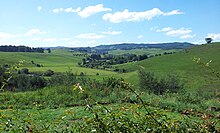
Many parts of the Midlands Meander resemble the Northern European countryside as there are lush green pastures for cattle to graze on, in order to produce milk and cheese and many species of European trees and bushes planted by the English and Dutch settlers.
The KwaZulu-Natal midlands can be hot and wet in summer, with average daily highs up to 30 °C, and average daily lows of 15 °C while winters are cool and dry, sometimes with snow and frost, with average daily high temperatures of 15 °C and daily lows of up to 0 °C. [1]

KwaZulu-Natal is a province of South Africa that was created in 1994 when the government merged the Zulu bantustan of KwaZulu and Natal Province.
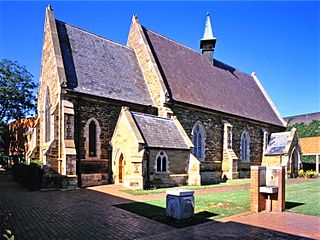
Pietermaritzburg is the capital and second-largest city in the province of KwaZulu-Natal, South Africa after Durban. It was named in 1838 and is currently governed by the Msunduzi Local Municipality. The town was named in Zulu after King Dingane's royal homestead uMgungundlovu. Pietermaritzburg is popularly called Maritzburg in Afrikaans and is often informally abbreviated to PMB. It is a regionally important industrial hub, producing aluminium, timber and dairy products, as well as the main economic hub of uMgungundlovu District Municipality. The public sector is a major employer in the city due to local, district and provincial government offices located here.

Howick is a town located in the UMngeni Local Municipality of KwaZulu-Natal Province, South Africa. The town is 1050 m above sea level, and about 88 kilometres from the port city of Durban. It experiences warm summers and cool, dry winters. A snappy chill descends upon Howick when snow falls on the nearby Drakensberg. The town is located on the N3 freeway, connecting it with the rest of South Africa.

The N3 is a national route in South Africa that connects Johannesburg and Durban, respectively South Africa's largest and third-largest cities. Johannesburg is the financial and commercial heartland of South Africa, while Durban is South Africa's key port and one of the busiest ports in the Southern Hemisphere and is also a holiday destination. Durban is the port through which Johannesburg imports and exports most of its goods. As a result, the N3 is a very busy highway and has a high volume of traffic.

Mooi River is a small town situated at 1,389 m above sea level and 160 km from the coast in KwaZulu-Natal, South Africa. The first European settlement in the area was at Mooi River Drift in 1852. This was formally named Weston in 1866 after the first Governor of Natal, Martin West.
Hilton is a small town that lies between Howick and Pietemaritzburg in the province of KwaZulu-Natal, South Africa. In 1872 the Reverend William Orde Newnham opened Hilton College on a large estate 7.8km north of the town, which is now one of South Africa's leading private schools.
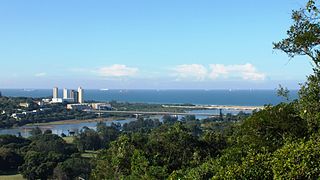
The Umgeni River or Mgeni River is a river in KwaZulu-Natal, South Africa. It rises in the "Dargle" in the KZN Midlands, and its mouth is at Durban, some distance north of Durban's natural harbour. It is generally agreed its name means "the river of entrance" in Zulu, though other meanings have been suggested.
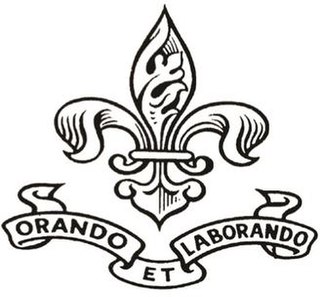
Hilton College, more commonly referred to as Hilton, is a South African private boarding school for boys located near the town of Hilton in the KwaZulu-Natal Midlands and is situated on a 1,762 ha estate that includes a 550 ha wildlife reserve and the 150 ha school campus
St Anne's Diocesan College is a private girls' boarding school situated in the small town of Hilton in the KwaZulu-Natal Midlands of South Africa.

The University of Natal was a university in the former South African province Natal which later became KwaZulu-Natal. The University of Natal no longer exists as a distinct legal entity, as it was incorporated into the University of KwaZulu-Natal on 1 January 2004. It was founded in 1910 as the Natal University College in Pietermaritzburg and expanded to include a campus in Durban in 1931. In 1947, the university opened a medical school for non-white students in Durban. The Pietermaritzburg campus was known for its agricultural engineering programmes, hence the nickname "the farmers" whilst the Durban campus was known as "the engineers," as it concentrated on other engineering programmes.
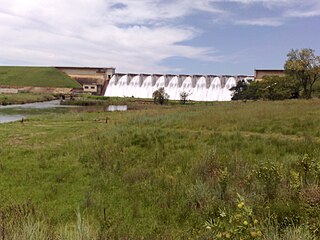
Midmar Dam is a combined gravity & earth-fill type dam and recreation area located near Howick and Pietermaritzburg, South Africa. Boating, swimming, waterskiing, picnicking, and fishing are popular pastimes at Midmar Dam. Each year, the Midmar Mile swimming race is held there, which organizers call "the world's largest open water swimming event". Over 20,000 entries were received for the 2009 event. Midmar Dam is located in the Midlands of KwaZulu-Natal. The dam's primary purpose is to serve for municipal and industrial use and its hazard potential has been ranked high (3).

Howick Falls is a waterfall in Howick, KwaZulu-Natal Province, South Africa. The waterfall is approximately 95 m in height (310 feet) and lies on the Umgeni River. The Zulu people called the falls KwaNogqaza, which means "Place of the Tall One".

Balgowan is a valley in the KwaZulu-Natal Midlands in South Africa.
Howick High School is a coeducational public school in Howick, KwaZulu-Natal, South Africa, established on 27 June 1967. Whilst it has a weekly boarding facility, known as Midmar House, which can accommodate up to 100 students who live in the local surrounding districts, Howick High School is not a full-time boarding school.

Michaelhouse is a full boarding senior school for boys founded in 1896. It is located in the Balgowan valley in the Midlands of KwaZulu-Natal, South Africa.
Lions River is a town in uMngeni Local Municipality in the KwaZulu-Natal province of South Africa, situated between Lidgetton and Howick in the center of the KwaZulu-Natal Midlands. Its name originates from the last lion which was shot in the area in 1856.

KZN Literary Tourism is a literary tourism research project initiated in 2002 by Professor Lindy Stiebel, a lecturer in the English Studies department at the University of KwaZulu-Natal. The project has created an online archive of over 100 writers linked to the KwaZulu-Natal province, collected reviews of local literature, conducted interviews of local authors, promoted local literary events such as Time of the Writer and investigated “the links between literature and tourism in scholarly colloquia and publications”. The project has also been responsible for creating eight writer trails which attempt to connect writers, their works and place within the province.
The Sleepy Hollow Killer is the name of an unidentified South African rapist and serial killer, thought to be responsible for the rapes and murders of at least 13 women, most likely sex workers, around Pietermaritzburg and the Midlands of KwaZulu-Natal. His signature was to strangle his victims using their panties, a characteristic shared with the murders of three prostitutes in 2007, who are also considered possible victims.
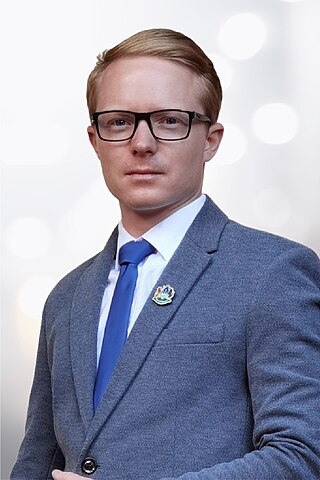
Christopher "Chris" John Pappas is a South African politician who is the mayor of the uMngeni Local Municipality. A member of the Democratic Alliance, he served as party's deputy provincial leader from 2021 until 2023. Pappas served as a member of the eThekwini city council from 2016 until 2019 and as a DA Member of the KwaZulu-Natal Legislature from 2019 to 2021.